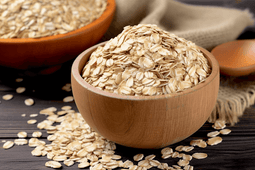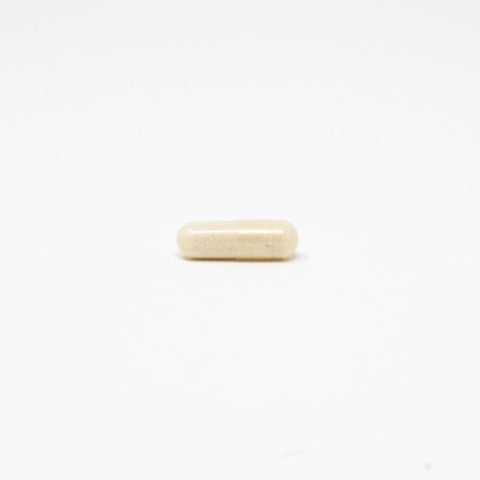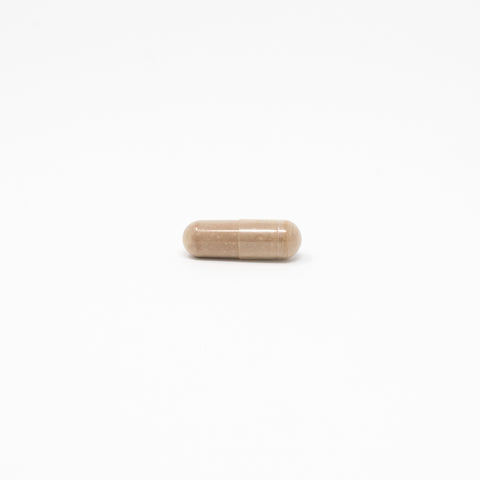Turmeric: The Ultimate Guide (Benefits, Dosage & Drawbacks)
Last updated:

What is Turmeric?
If you're someone who takes their health pretty seriously, then you're likely familiar with or have heard of turmeric. From sipping on a golden milk latte, to adding a dash of turmeric powder to your favorite curry recipe, chances are you're interested in reaping the benefits of this vibrant golden root.
Turmeric is a root, scientifically known as Curcuma longa. Judging by the shape and size, you can easily tell that it's a member of the ginger family. This root grows in tropical regions of India, Asia, and Central America, among other places. What makes turmeric so special is its active compound known as curcumin or curcuminoid.
And this is precisely what gives it that signature bright yellow-orange hue! If you're always on the lookout for natural remedies and supplements that can give you an extra boost, a turmeric supplement is one of your best options for better overall health.
How does Turmeric work?
For starters, the rhizome or the root of the turmeric plant is where all the good stuff comes from! As mentioned above, the active ingredient in turmeric is a compound called curcumin.1 Curcumin is a powerful antioxidant with anti-inflammatory properties, making it a popular natural remedy for many health conditions.
Why you need Turmeric
Whether you plan to add it to your everyday meals or take a supplement, turmeric plays an important role in maintaining your health. It supports your digestive system and eases your joints. More importantly, its antioxidant properties have been shown to possibly help with cancer, premenstrual syndrome (PMS), and even viral infections.2
Can your body produce Turmeric?
While your body can't produce turmeric or curcumin on its own, you can still get the health benefits of these compounds by taking a turmeric or curcumin supplement.
You'll want to check out VitaRx's turmeric supplements to kickstart your best health! Our products are expertly formulated with high-quality ingredients to ensure maximum effectiveness. Plus, daily use can improve your overall health.
What are some signs of deficiency?
Thankfully, the lack of turmeric doesn't cause any deficiencies. Using turmeric root or taking a dietary supplement is still beneficial for your body. This is because it has plenty of health benefits. Here are some of the best Turmeric benefits:
- Provides anti-inflammatory and antioxidant properties
- Supports your cardiovascular health3
- Reduces depression and promotes a balanced mood
- Relieves your joint pain and swelling
What are the benefits of Turmeric?
This vibrant yellow spice doesn't just add flavor to your food, it also supports your overall health. One of the biggest benefits of turmeric is its ability to protect your body from free radicals, which can cause disease and cell damage.
Turmeric's main health benefits include the following:
- According to Cleveland Clinic, turmeric can lower chronic inflammation and pain.4 In traditional medicine, it is used for treating arthritis and managing joint pain.
- Turmeric may also help manage cholesterol levels and reduce high blood pressure.5
- Turmeric may increase serotonin and dopamine production, the brain chemicals that regulate your mood, which has been shown to help depression. .6
- Several studies also show that curcumin in Turmeric may affect cancer growth and development.7
Now that you know about its benefits, you'll be glad to find that we offer some of the best Turmeric dietary supplements available on the market! And we make it easy for you to add it to your personalized 30-day vitamin pack. Check out our high-quality capsules at VitaRx and experience all the best effects of Turmeric!
What's the recommended Turmeric dosage?
No matter what kind of supplement you choose, it's essential that you take the correct dose and learn about any risks or potential interactions it could have with other drugs.
Dosage per age group
The general adult population can take anywhere from 250 to 1,000 milligrams per day. It's safe to take up to eight grams per day, but it's best to lean on the lighter side.4 Taking a turmeric supplement is not typically recommended for children. It's best to speak to a knowledgeable healthcare professional before giving your child turmeric. Pregnant and breastfeeding women should also avoid supplementing turmeric and should consider speaking to their healthcare provider before making any changes or additions to their diet.
Who should take it?
This dietary supplement is perfect for healthy adults that want an extra boost in overall health. It's also great for anyone who is interested in regulating feelings of depression or managing joint and arthritis pain. It's also common to use turmeric for cardiovascular health or to reduce any inflammation within the body. If you fit any of the above descriptions, you'll want to highly consider taking turmeric!
Who should not take it?
These supplements are typically not recommended for those who are pregnant or breastfeeding.8 It's best to stay safe and avoid use if you fall into this demographic. It's always best to consult with a healthcare professional before changing or adding anything to your diet. This is especially the case if you're currently taking medications.
How much is too much? (Turmeric overdose)
You typically won’t have any issues with consuming turmeric when it's used in food. However, when it comes to supplements, it's ideal to use the dietary supplement for up to three months (if you're taking a lower dose) and reevaluate after that. Some people experience very mild side effects with taking turmeric long-term. If you experience any side effects, like nausea, dizziness, or an upset stomach, then we highly recommend that you talk to your primary healthcare provider.9
Source of Turmeric
Foods
If you're looking for fresh turmeric root, you can easily find it in the produce section at grocery stores and supermarkets. Try not to mistake the golden root for ginger, as they do look very similar! The root can be peeled, grated, chopped, and added to dishes or smoothies for a fresher and more intense flavor. Turmeric tea is also gaining in popularity because it's an easy and comforting way to get its health benefits. And of course, there's also the spice or powder, typically added to stews, sauces, marinades, soups, and more.
Supplements
With the hustle and bustle of everyday life, incorporating turmeric into your meals can take some effort. Thankfully, you can opt for our turmeric supplement to make sure you're getting the health boost you need. It's an easy way to add turmeric to your routine without having to worry about preparing fresh foods or boiling the root for tea. The most common forms are tablets, capsules, and extracts. Capsules and tablets are popular because they're easy to take and available in different doses. Extracts are a more concentrated form of turmeric that can be added to water or juice. Just keep in mind that what matters most is the quality of the turmeric product that you choose.
Here at VitaRx, our selection of health products can help you reach your health goals. And our daily vitamin packs are customized and personalized which makes it easier for you to get a healthy dose of extra nutrients into your day. You'll only find the highest-quality nutrients in capsule form, and you'll be glad to know that it's all tested by advanced private laboratories. We make it convenient for you to maintain and boost your health.
What to look for in nutrition supplements
When it comes to choosing the right turmeric supplement, there are a few things you'll want to consider like the dose, delivery method, quality, and manufacturing. Let's take a look at these factors below!
Dosage and Potency
If you want the full health benefits of turmeric while avoiding potential side effects, taking the right dose is essential. The suggested dose depends on your age, sex, weight, and general health status. Too much could lead to side effects like abdominal pain, stomach upset, dizziness, or nausea. Taking too little of a dose may not provide you desired beneficial results. That's why it's important you choose a reputable brand and consult a professional to help you achieve your health goals.
Quantity and Delivery Method
When you buy too much at one time, it can lead to unnecessary waste. If you buy too little , it may not be enough or could end up costing more. It's important you have an adequate supply of turmeric to achieve your desired results and avoid racing against an expiration date. Apart from the amount, you should also choose a delivery method that makes a healthy lifestyle easy and attainable. We would agree that taking it in capsule form is best for those who want something easy to swallow.
Quality and Manufacturing
High-quality turmeric products are made with raw, organic ingredients. With diluted potency, you may not see the full extent of turmeric's benefits. So, if you want to find a quality turmeric supplement, make sure it meets all Food and Drug Administration (FDA) requirements.
Why VitaRx
Reason 1 Dosage / Potency
VitaRx's supplements are specially formulated to provide the right dosage. We use high-quality ingredients and strict manufacturing standards to ensure that each dose contains the optimal active ingredients for maximum effectiveness.
Reason 2 Quantity / Delivery Method
VitaRx offers daily supplement packs, so you never have to worry about overspending on a large bottle or keeping track of the expiration dates again. And all our dietary supplements are in tablets and soft gel form, which are more convenient for traveling, than powders or liquids, as they can fit easily in a purse or bag.
Reason 3 Quality / Manufacturing
All VitaRx dietary supplements are manufactured in the US and tested by third parties. All products are manufactured using the FDA’s Good Manufacturing Practices (cGMPs); All our organic products are certified by Organic Assurance International (QAI). And all organic products comply with the National Organic Program (NOP).
Turmeric FAQ
How to store Turmeric?
To store turmeric properly, the best way is to keep it in an airtight container in a cool, dark, and dry place. Avoid storing it near the stove or in humid areas like the pantry because this can affect the flavor and strength. Make sure to keep it away from children and pets for safety.
Is it okay to take Turmeric every day?
Yes, it is! As long as you take the correct daily dose, you can take it every day for up to eight weeks.9 If you plan to take it every day, you'll need the right dose to prevent any potential side effects. Remember that you should also check with your healthcare provider to see if consuming a turmeric supplement might interact with any of your medications.
When is the best time to take Turmeric?
When to take turmeric is not as important as how you take it. Whether you have it in the morning or at night, turmeric products are best eaten with a meal to help with absorption. For example, black pepper has a compound called piperine, which helps your body absorb the disease-fighting qualities in curcumin. Taking turmeric with black pepper can significantly increase curcumin’s benefits.10
How long does it take for Turmeric to work?
According to WebMD, it can take a few weeks for most turmeric to take effect and boost your cardiovascular health, joint function, and digestive health. If you're taking turmeric for joint pain, for example, it's best to take it consistently to see the best results!
What should you not take with Turmeric?
There are some possible interactions with taking any turmeric supplement. Before incorporating this into your daily life, you may want to consider talking to a doctor if you're currently taking medications like blood thinners, diabetes medications, or any drugs that may reduce stomach acid.8
Does Turmeric help with depression?
There's growing scientific evidence that turmeric affects the parts of your brain that control your mood and behavior. We don't recommend using it as an alternative to medication or therapy, but using turmeric to help with depression can involve regulating mood and stress, as well as relieving symptoms of depression.11
How does Turmeric reduce inflammation?
Many studies have shown that turmeric does, in fact, reduce inflammation thanks to its main antioxidant. Antioxidants will scavenge molecules in your body to prevent damage. Curcumin specifically lowers the levels of two enzymes in the body that cause inflammation.8
Can you take Turmeric and Vitamin D together?
Yes, you can. While there was some concern regarding whether turmeric and Vitamin D negatively interacted, we're happy to share that a study confirmed it has positive effects on Vitamin D levels. Turmeric will not affect the optimal absorption of Vitamin D, so you're all good to go! It led to a significant improvement in Vitamin D levels and did not affect blood glucose.12
Conclusion
Overall, consuming turmeric daily can be a safe and healthy way to support every aspect of your health and well-being. Just make sure that you speak with a healthcare provider before doing so to avoid any potential adverse effects. When used consistently, turmeric, as an antioxidant and anti-inflammatory, could provide you with a multitude of benefits like better digestion, less inflammation, and a lower risk of heart disease or cancer.
For maximum effectiveness, you'll want to check out our Turmeric capsule and add it to your personalized daily packs. Here at VitaRx, we choose the highest quality products so you get all the health benefits you're looking for in an easy and convenient way. Plus, everything is delivered straight to your door!
Key takeaways
- Turmeric is a golden root related to ginger often used in Ayurvedic medicine.
- Since it's an herbal medicine, your body cannot produce it.
- There are no signs of a deficiency in turmeric.
- The most commonly known benefits of turmeric include soothing inflammation, supporting digestion, boosting immunity, improving joint pain, and regulating mood.
- Healthy adults who want a natural way to soothe chronic pain, boost their immune system, and lower their risk of cardiovascular disease will benefit from taking a turmeric supplement.
- Children and mothers who are pregnant or nursing should avoid taking turmeric.
- Turmeric can be found in the form of a root, spice powder, or even an extract, but the best option is to take daily doses in an easy-to-swallow supplement form.
References
- Turmeric and Curcumin: Health, Spice, and Supplement Information From WebMD
- Health Benefits of Turmeric
- Protective Effects of Curcumin in Cardiovascular Diseases—Impact on Oxidative Stress and Mitochondria - PMC
- 7 Health Benefits of Turmeric
- Curcumin as a potential protective compound against cardiac diseases
- Antidepressant activity of curcumin: involvement of serotonin and dopamine system
- Curcumin as an inhibitor of angiogenesis
- Turmeric Information | Mount Sinai - New York
- TURMERIC: Overview, Uses, Side Effects, Precautions, Interactions, Dosing and Reviews
- Therapeutic Roles of Curcumin: Lessons Learned from Clinical Trials - PMC
- Can Turmeric Help With Depression?
- Effects of curcumin supplementation on vitamin D levels in women with premenstrual syndrome and dysmenorrhea: a randomized controlled study





